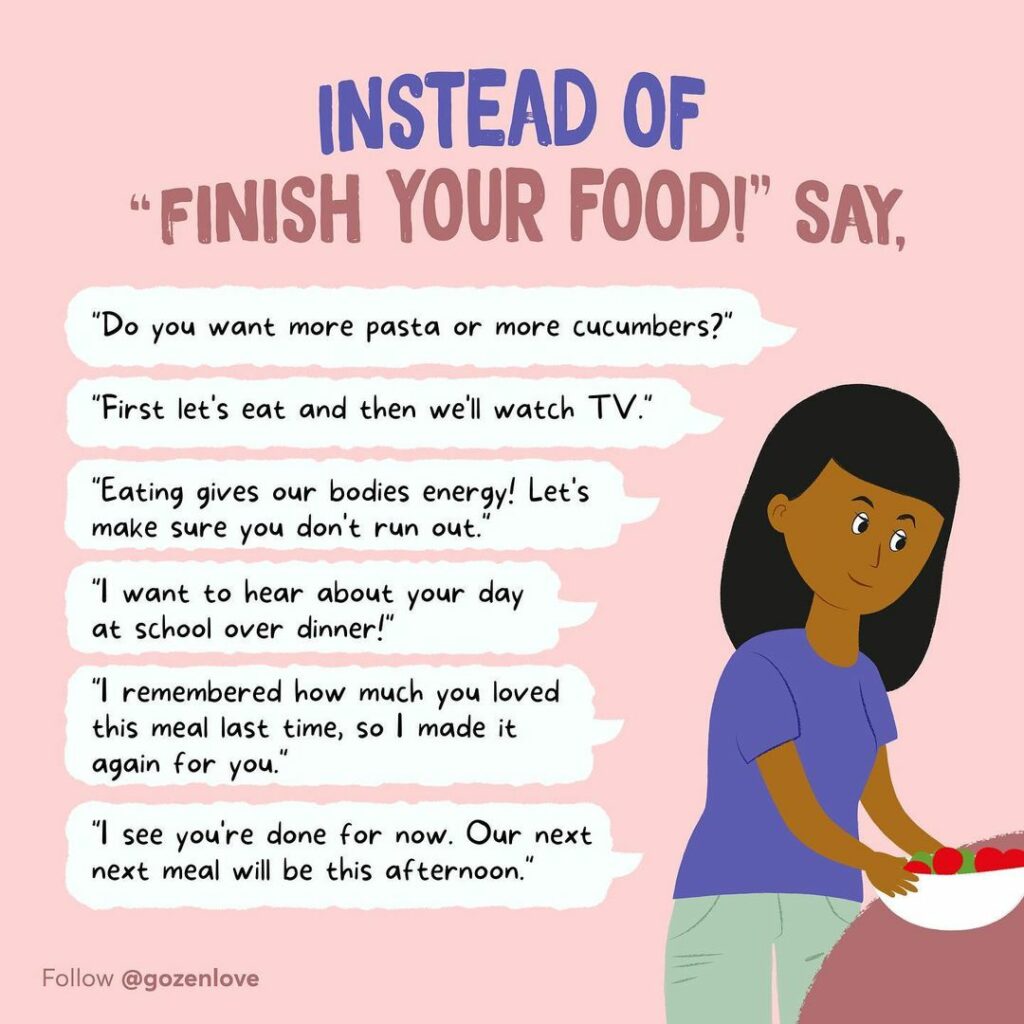You’ve used them. Your parents used them. Their parents used them. I’m talking about classic mealtime parenting phrases. Let’s see how many we can name:
“Don’t play with your food.” “Chew with your mouth closed!” “Stay in your seat.” And then there’s the always popular “Finish your food!”
We want our children to eat all the food on their plates at every meal, and for plenty of good reasons: we don’t want food to go to waste; we want our little people to be well nourished; we associate ‘eating everything’ with good health; we worked hard to prepare the meals and want to feel like it was appreciated.
But believe it or not, using such a simple, common phrase like “finish your food!” can backfire. We know, it feels like EVERYTHING can backfire these days, but hear us out. Pressure to eat can lead our children into an unhealthy relationship with food. Rather than follow their hunger cues, they may feel shame, guilt, or an obligation to eat, even if they’re not hungry.
Plus, mealtime can turn into an anxiety-ridden battleground of wills, when what we really want is a fun-filled opportunity to connect and reflect.
So let’s practice replacing “Finish your food!” with language that supports our children’s emotional and physical health. Here are 6 phrases that support behavior modification in a loving, helpful way.

1. “Do you want more pasta or more cucumbers?”
Like most adults, kids generally appreciate having autonomy over their decisions. We’re showing them respect, and helping them practice decision-making and problem-solving, when we give them a choice between two healthy food options. As a bonus, we also “win” since we get our kids to eat nutritious food.
2. “First, let’s eat and then we’ll watch TV.”
Kids generally go for instant rather than delayed gratification. That’s why we sometimes have to fuss so hard to get them to eat! But through co-regulation, we invite our children to learn how to prioritize less-preferred tasks. They’ll begin to value nutrition and nourishment before they play.
3. “Eating gives our bodies energy! Let’s make sure you don’t run out”
As adults, we know that food fuels our bodies. Our kids are still learning this fact. Let’s promote a healthy relationship with ‘food as fuel’ as we discuss nutrition and how our bodies use the foods we eat. While we honor our children’s energy, we also inform their future eating habits and choices.
4. “I want to hear about your school day over dinner.”
Mealtime is about more than eating food. Sharing meals also gives us uninterrupted time to talk, laugh and reflect together. We tap into our children’s desire to connect when we talk as we eat. Our undivided attention and listening ears help our children feel loved, too, which can prompt them to… wait for it… actually eat!
5. “I remembered how much you loved this meal last time, so I made it again for you.”
When our children refuse to eat, they’re focused on what they don’t like. This gentle reminder invites children to think about a pleasurable eating experience they enjoyed in the past. We don’t use this phrase to manipulate our kids with guilt. Rather, it’s a reminder that taps into their emotions. And our love, care, and cooking skills may motivate reluctant children to eat.
6. “I see you’re done for now. Our next meal will be this afternoon.”
Practically no parent wants to be a short-order cook, am I right? And we know that snacking can lead to emotional, as opposed to healthy, eating habits. So, in a loving, gentle way, let’s set boundaries about when food will be served. Instead of pushing our kids or demanding results, we show respect when we allow them to tell us when they’re finished. We still retain our authority as parents, too.
Through gentle, loving and helpful language, we can modify our children’s behavior during mealtime. Let’s take some stress off of our kid’s plates and enjoy dinner time together! AND, if you’re interested in more help promoting healthy relationships with food, as well as appreciation for our amazing bodies, check out the new GoZen! Body Confidence Kit.